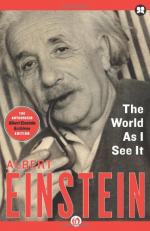
|
| Name: _________________________ | Period: ___________________ |
This test consists of 15 multiple choice questions and 5 short answer questions.
Multiple Choice Questions
1. What did Einstein think should be done with patriotic women?
(a) They should work in factories.
(b) They should be sent to the front.
(c) They should pray for peace.
(d) They should keep the home fires burning.
2. What was Einstein's position in a nutshell?
(a) Isolationism is best.
(b) Mere agreements to limit armaments furnish no security.
(c) Intellectuals will finally triumph.
(d) War is useless.
3. What determines the true value of a human being?
(a) how much charitable work he has done.
(b) how happy and contented he is.
(c) to what extent he has attained liberation from the self.
(d) how much intellectual knowledge he has attained.
4. What did H.A. Lorentz devote himself to?
(a) writing books
(b) research
(c) reconciliation
(d) religion
5. To which famous psychologist did Einstein write?
(a) Sigmund Freud.
(b) Wilhelm Wundt.
(c) William James.
(d) Carl Jung.
6. What is "apparent" overproduction?
(a) A misunderstanding that the amount produced is too much.
(b) A mistake in the statistics of what is actually produced.
(c) Production exceeds the demand.
(d) Not the demand but consumers' purchasing power is lacking.
7. What are the peoples of all countries guilty of which make disarmament impossible?
(a) cowardice.
(b) indifference and slackness.
(c) stupidity.
(d) anger and greed.
8. What did Einstein feel was the main cause of the crisis the world faced?
(a) stupidity.
(b) technical progress.
(c) ignorance.
(d) human laziness.
9. Einstein wrote an article in honor of which birthday of Arnold Berliner's ?
(a) the eightieth
(b) the ninetieth
(c) the sixtieth
(d) the seventieth
10. What did Einstein think was the chief duty of the State?
(a) to keep the economy prosperous.
(b) to support welfare programs.
(c) to enforce the law and arrest criminals.
(d) protect the individual, giving him opportunity for creative growth.
11. What philosopher said: "a man can do as he will, but not will as he will" , a saying which inspired Einstein from his youth up?
(a) Heidegger.
(b) Nietzsche.
(c) Schopenhauer.
(d) Kant.
12. What is the silently accepted motto of people having no civil courage?
(a) "War in inevitable."
(b) "It will be worked out somehow."
(c) "Leave it alone and don't speak of it."
(d) "What's the use?"
13. What is the principle art of a teacher according to Einstein?
(a) the ability to teach but also maintain discipline.
(b) the ability to hold the interest of his/her students.
(c) the abiliity to inspire students to get high marks.
(d) to awaken the joy in creation and knowledge.
14. What did Einstein deem the most important thing in helping humanity forward?
(a) scientific advancements.
(b) the example of great and pure characters.
(c) money and economic well-being.
(d) school education.
15. How many years did Einstein spend in Berlin?
(a) 20.
(b) 17.
(c) 10.
(d) 18.
Short Answer Questions
1. Who was Einstein's closest friend during the time he spent in Berlin?
2. How many men refusing to fight on conscientious grounds at the same moment did Einstein think would be irresistible?
3. What did Popper-Lynkaeus feel society was responsible for?
4. What non-political authority did the League of Nations create?
5. What did Einstein feel was the greatest obstacle to world order?
|
This section contains 516 words (approx. 2 pages at 300 words per page) |

|




